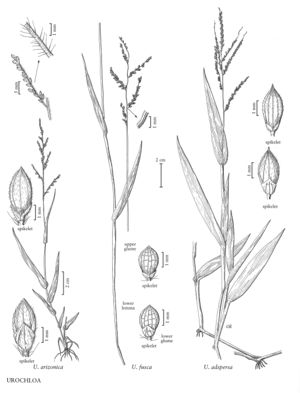Difference between revisions of "Urochloa fusca"
FNA>Volume Importer |
FNA>Volume Importer |
||
| Line 7: | Line 7: | ||
|synonyms={{Treatment/ID/Synonym | |synonyms={{Treatment/ID/Synonym | ||
|name=Urochloa fasciculata | |name=Urochloa fasciculata | ||
| − | |authority= | + | |authority= |
| + | |rank=species | ||
}} {{Treatment/ID/Synonym | }} {{Treatment/ID/Synonym | ||
|name=Panicum fasciculatum var. reticulatum | |name=Panicum fasciculatum var. reticulatum | ||
| − | |authority= | + | |authority= |
| + | |rank=variety | ||
}} {{Treatment/ID/Synonym | }} {{Treatment/ID/Synonym | ||
|name=Panicum fasciculatum | |name=Panicum fasciculatum | ||
| − | |authority= | + | |authority= |
| + | |rank=species | ||
}} {{Treatment/ID/Synonym | }} {{Treatment/ID/Synonym | ||
|name=Brachiaria fasciculata | |name=Brachiaria fasciculata | ||
| − | |authority= | + | |authority= |
| + | |rank=species | ||
}} | }} | ||
|hierarchy=Poaceae;Poaceae subfam. Panicoideae;Poaceae tribe Paniceae;Urochloa;Urochloa fusca | |hierarchy=Poaceae;Poaceae subfam. Panicoideae;Poaceae tribe Paniceae;Urochloa;Urochloa fusca | ||
| Line 29: | Line 33: | ||
-->{{Treatment/Body | -->{{Treatment/Body | ||
|distribution=Okla.;N.Mex.;Tex.;La.;Puerto Rico;Virgin Islands;Ala.;Ga.;Ariz.;Fla. | |distribution=Okla.;N.Mex.;Tex.;La.;Puerto Rico;Virgin Islands;Ala.;Ga.;Ariz.;Fla. | ||
| − | |discussion=<p>Urochloa fusca grows from the southern United States to Peru, Paraguay, and Argentina, usually in moist, often disturbed areas at low elevations. It frequently occurs as a weed, but is occasionally grown for forage and grain.</p><!-- | + | |discussion=<p><i>Urochloa fusca</i> grows from the southern United States to Peru, Paraguay, and Argentina, usually in moist, often disturbed areas at low elevations. It frequently occurs as a weed, but is occasionally grown for forage and grain.</p><!-- |
| − | --><p>Plants having smaller, more compact panicles and larger (2.4-3.4 mm), mostly yellowish spikelets have been referred to as Urochloa fusca var. reticulata (Torr.) B.F. Hansen & Wunderlin. This variety is mainly found in the southwestern United States, but has been intro¬duced into other areas, including Australia. Urochloa fusca (Sw.) B.F. Hansen & Wunderlin var. fusca has generally larger, more open panicles and smaller (2-2.5 mm), reddish-brown or bronze-colored spikelets. Much intergradation is reported between the two varieties. Further investigation is needed to establish that their recognition is warranted.</p> | + | --><p>Plants having smaller, more compact panicles and larger (2.4-3.4 mm), mostly yellowish spikelets have been referred to as <i>Urochloa fusca</i> var. reticulata (Torr.) B.F. Hansen & Wunderlin. This variety is mainly found in the southwestern United States, but has been intro¬duced into other areas, including Australia. <i>Urochloa fusca</i> (Sw.) B.F. Hansen & Wunderlin <i></i>var.<i> fusca</i> has generally larger, more open panicles and smaller (2-2.5 mm), reddish-brown or bronze-colored spikelets. Much intergradation is reported between the two varieties. Further investigation is needed to establish that their recognition is warranted.</p> |
|tables= | |tables= | ||
|references= | |references= | ||
| Line 39: | Line 43: | ||
-->{{#Taxon: | -->{{#Taxon: | ||
name=Urochloa fusca | name=Urochloa fusca | ||
| − | |||
|authority=(Sw.) B.F. Hansen & Wunderlin | |authority=(Sw.) B.F. Hansen & Wunderlin | ||
|rank=species | |rank=species | ||
| Line 46: | Line 49: | ||
|basionyms= | |basionyms= | ||
|family=Poaceae | |family=Poaceae | ||
| − | |illustrator=Linda A. Vorobik | + | |illustrator=Linda A. Vorobik;Cindy Roché |
| + | |illustration copyright=Utah State University | ||
|distribution=Okla.;N.Mex.;Tex.;La.;Puerto Rico;Virgin Islands;Ala.;Ga.;Ariz.;Fla. | |distribution=Okla.;N.Mex.;Tex.;La.;Puerto Rico;Virgin Islands;Ala.;Ga.;Ariz.;Fla. | ||
|reference=None | |reference=None | ||
| Line 52: | Line 56: | ||
|publication year= | |publication year= | ||
|special status= | |special status= | ||
| − | |source xml=https:// | + | |source xml=https://jpend@bitbucket.org/aafc-mbb/fna-data-curation.git/src/f50eec43f223ca0e34566be0b046453a0960e173/coarse_grained_fna_xml/V25/V25_1317.xml |
|subfamily=Poaceae subfam. Panicoideae | |subfamily=Poaceae subfam. Panicoideae | ||
|tribe=Poaceae tribe Paniceae | |tribe=Poaceae tribe Paniceae | ||
Revision as of 21:32, 16 December 2019
Plants annual; tufted. Culms 15-120 cm, geniculate; nodes glabrous or shortly pilose. Sheaths glabrous or hispid, margins ciliate; ligules 1-1.5 mm; blades 3-33 cm long, 5-20 mm wide, glabrous or sparsely pilose on both surfaces, margins smooth or scabrous; collars pubescent. Panicles 5-15 cm long, 2-8 cm wide, simple, with 5-30 spikelike primary branches in more than 2 ranks; primary branches 2-10 cm, appressed to divergent, axils glabrous, axes 0.3-0.5 mm wide, triquetrous, scabrous or sparsely pilose; secondary branches usually present on the lower primary branches, pedicels scabrous and pubescent, shorter than the spikelets. Spikelets 2-3.4 mm long, 1.2-1.8 mm wide, obovoid, yellowish to reddish-brown or bronze-colored at maturity, mostly paired, in 2-4 rows, appressed to the branches. Glumes scarcely separate, rachilla internodes short, not pronounced; lower glumes 1-1.5 mm, at least lA as long as the spikelets, glabrous, (1)3-5-veined; upper glumes (2)2.2-3.1 mm, glabrous, 7-9-veined, cross venation evident throughout; lower florets usually staminate, sometimes sterile; lower lemmas 2-3.1 mm, usually glabrous, 7-veined, cross venation evident throughout; lower paleas present; upper lemmas 1.8-2.9 mm long, 1.1-1.7 mm wide, apices acute to rounded, mucronate; anthers 1-1.6 mm. Caryopses 1-1.7 mm; hila punctiform. 2n = 18, 36.
Distribution
Okla., N.Mex., Tex., La., Puerto Rico, Virgin Islands, Ala., Ga., Ariz., Fla.
Discussion
Urochloa fusca grows from the southern United States to Peru, Paraguay, and Argentina, usually in moist, often disturbed areas at low elevations. It frequently occurs as a weed, but is occasionally grown for forage and grain.
Plants having smaller, more compact panicles and larger (2.4-3.4 mm), mostly yellowish spikelets have been referred to as Urochloa fusca var. reticulata (Torr.) B.F. Hansen & Wunderlin. This variety is mainly found in the southwestern United States, but has been intro¬duced into other areas, including Australia. Urochloa fusca (Sw.) B.F. Hansen & Wunderlin var. fusca has generally larger, more open panicles and smaller (2-2.5 mm), reddish-brown or bronze-colored spikelets. Much intergradation is reported between the two varieties. Further investigation is needed to establish that their recognition is warranted.
Selected References
None.
